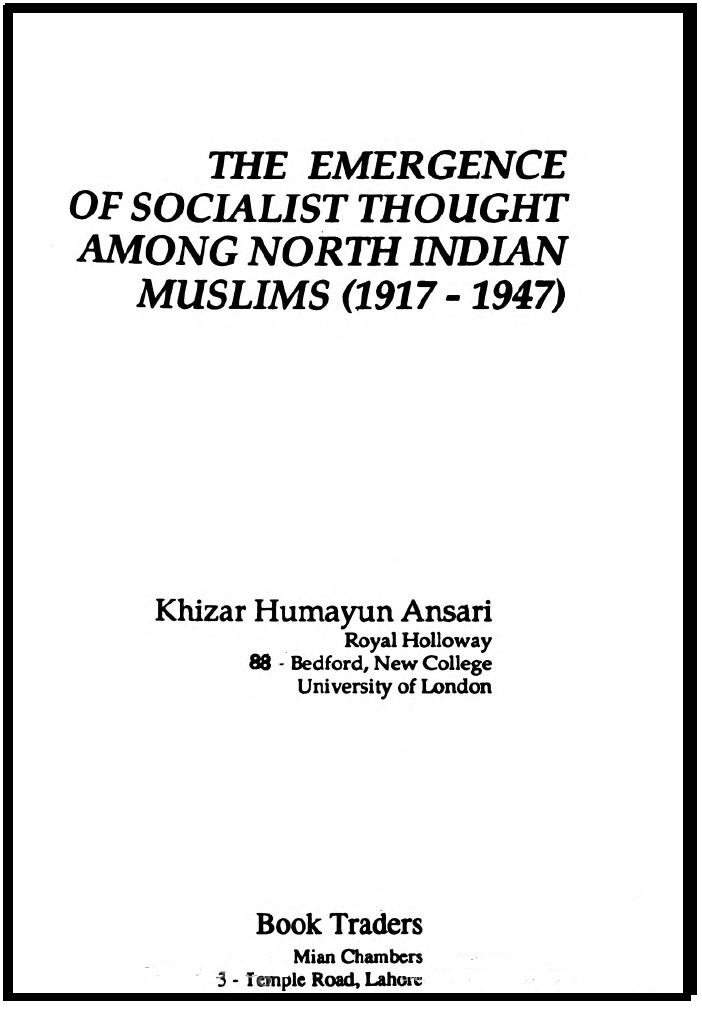Biblioteca / 1990-1999
Khizar Humayun Ansari. The Emergence of Socialist Thought Among North Indian Muslims (1917-1947).
Lahore, Pakistán: Book Traders, 1990.
510 páginas.
La conciliación de los principios islámicos básicos con la modernidad ha sido un reto importante para los musulmanes en los dos últimos siglos. Este estudio descubre las respuestas de los musulmanes indios que se sintieron atraídos por las ideas socialistas entre la Revolución bolchevique y la Partición. Desde los muhajirin panislamistas, que emigraron a la Asia Central soviética durante la agitación del Khilafat de 1919-24, hasta los radicales literarios de clase alta del Movimiento de Escritores Progresistas de las décadas de 1930 y 1940, el socialismo proporcionó a los radicales musulmanes un conjunto de herramientas intelectuales para analizar su propia sociedad y construir estrategias de emancipación de la opresión occidental. De hecho, los principios de libertad, igualdad y fraternidad que existían en la ideología islámica animaron a los socialistas musulmanes a adoptar un modo de pensamiento secular. Reconocer estas corrientes familiares en la teoría socialista legitimó su fascinación por el socialismo. Este libro arroja luz sobre el hecho de que el separatismo religioso y político no fueron los únicos caminos adoptados por los musulmanes del norte de la India para avanzar bajo el dominio colonial.
CONTENTS
INTRODUCTION
CHAPTER I
THE EMERGENCE OF THE EARLY MUSLIM SOCIALISTS
Pan-Islamism becomes increasingly anti-British
The Muhajirin make contact with Bolshevism
The Khilafat Movement: The Second Wave of Muhajirin
The Muhajirin are converted to Socialism
CHAPTER II
MUSLIM SOCIALIST ACTIVITY IN INDIA: 1917-1934
The Responses of the Indian Muslims to the Russian Revolution
The Khilafat Movement and Beginnings of Socialist Action Muslims and the Growth of Early Communist
Organisation in India
Early Muslim Communist Activity
Muslim Responses to British Repression
Muslims and the Development of Socialist Organisation in the mid-1920s
The Rise of Nehru and the Decline of Communism between 1929 and 1934
CHAPTER III
THE INTELLECTUAL ORIGINS OF THE LATER MUSLIM SOCIALISTS
The Growth of the Reforming Attitude
The Romantic Movement in Urdu Literature: 1914-1936
Other Indian Sources of Inspiration
The Impact of Western Writers
CHAPTER IV
THE SOCIAL BACKGROUND OF MUSLIM SOCIALISTS OF 1930s AND 1940s
The Origins of Muslims Socialists – The Development of the North Indian Qasbah
The Qasbah Inheritance
The Impact of British Rule
The Problems of the New Muslim Elite
The Emergence of Women Progressive Writers
CHAPTER V
MUSLIM SOCIALISTS AND THE PWA: 1936-1947
The Background to the Formation of the PWA
The Formation of the PWA in London
The Establishment of the PWA in India
The Organisation of the PWA
Organising a People’s Literature
The PWA’s Confrontation with the Government: the ‘Imperialist Phase’ of the War, September 1939-June 1941
The ‘People’s War Phase’: 1941-1945
The Development of the PWA as an Onmisation: 1942-1947
The PWA and the Demand for Pakistan
CHAPTER VI
THEMES IN MUSLIM SOCIALIST LITERATURE
New Literary Forms
Realism
Revolutionary Romanticism
The Emergence of a Proletarian Style
Content of Progressive Literature
Religion and Morality
The Position of Muslim Women
Poverty and Exploitation
British Imperialism
Communalism
CONCLUSION
APPENDIX I
APPENDIX II
APPENDIX III
